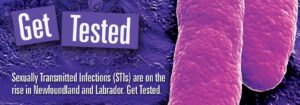Get Tested, Sexually Transmitted and Blood Borne Infections (STBBIs)
What is an STBBI test?
An STBBI test is done by collecting a blood and a urine sample and by swabbing the affected areas, such as throat and anus. A health-care professional begins by asking you about your sexual history. All health information is confidential. The health-care provider may also perform an examination.
When should I have a STBBI test?
If you are having sex, you need to have an STBBI test, even if you don’t have any symptoms.
Other reasons to get an STBBI test are:
- You think you might have an STBBI or are at risk.
- Have been advised by a partner that you are a contact for an STBBI.
- You have had unprotected sex, that is, without a condom or oral dam – including vaginal, oral or anal sex.
- You have had a condom break or it has fallen off during sex.
- Your partner has another sexual partner or has had previous sexual partners.
- You have shared equipment for injecting drugs.
- You are starting a new sexual relationship.
- Depending on the number of sexual partners you have, you may require STBBI testing every three months.
If you are unsure whether you need an STBBI test, talk to a health-care provider
Getting the results
Test results are normally received in one to two weeks. If your result is positive, sexual partners also need to be tested and treated. Otherwise, you could keep re-infecting each other. The person who tests positive will not be identified to their sexual partners.
Even before the results come back, a person with symptoms of a STBBI can begin treatment. Remember most STBBIs can be cured. STBBIs that cannot be cured can now be managed well. It is important to see your healthcare provider about treatment options.
It is important to remember that routine blood work does not detect STBBIs. Testing for certain STBBIs, such as HIV, Hepatitis C and Syphilis, require a specific test. Also, a urine test will not detect STBBI infections in other areas such as the mouth or anus. For more information, talk to your health-care provider.
It is also important to remember that a Cervical Screening (pap test) does not test for STBBIs.
A pap test can help prevent cancer of the cervix. It is a way to pick up any changes in the cells of your cervix. For more information talk with a healthcare provider and visit the cervical screening guidelines.
Testing is available through the following:
- Make an appointment with your health-care provider.
- Contact Planned Parenthood — NL Sexual Health Centre at 1-877 NO MYTHS (666-9847) or 709-579-1009
- Medicuro Virtual Health Clinic
- Virtual health care offered by health-care providers in Newfoundland & Labrador.
- Eastern-Urban:
- Contact the Sexual Health Clinic at sexualhealthclinic@easternhealth.ca (NLHS Eastern-Urban Zone)
- Contact the community walk-in clinic at 709-777-1706
- Labrador-Grenfell Zone:
- Point of Care Testing for Syphilis and HIV are available in the following locations:
- Nain Community Clinic, 28 Ikajuktauvik St. – (709) 922-2912
- Natuashish Community Clinic, 82 Katshinak St. – (709) 478-8842
- Hopedale Community Clinic, 16 Centre St – (709) 933-3857
- Makkovik Community Clinic, 42-50 Moravian St. – (709) 923-2229
- Postville Community Clinic, 3 Park Dr. – (709) 479-9851
- Rigolet Community Clinic, 7 Riche’s Seashore Dr. – (709) 947-3386
- Mani Ashini Community Clinic, North West River/Sheshatshiu, 193 Shimun St. – (709) 497-8351
- For all other STBBIs, contact your local community clinic or health centre.
Other services related to this information:
- Contact your Public Health Nurse.
- 811 HealthLine (Newfoundland & Labrador) – Call 811 or 1-888-709-2929 / TTY 1-888-709-3555
- For information on doxy-PEP: CATIE doxy PEP
- Safe Works Access Program (SWAP), AIDS Committee of Newfoundland and Labrador (ACNL)


